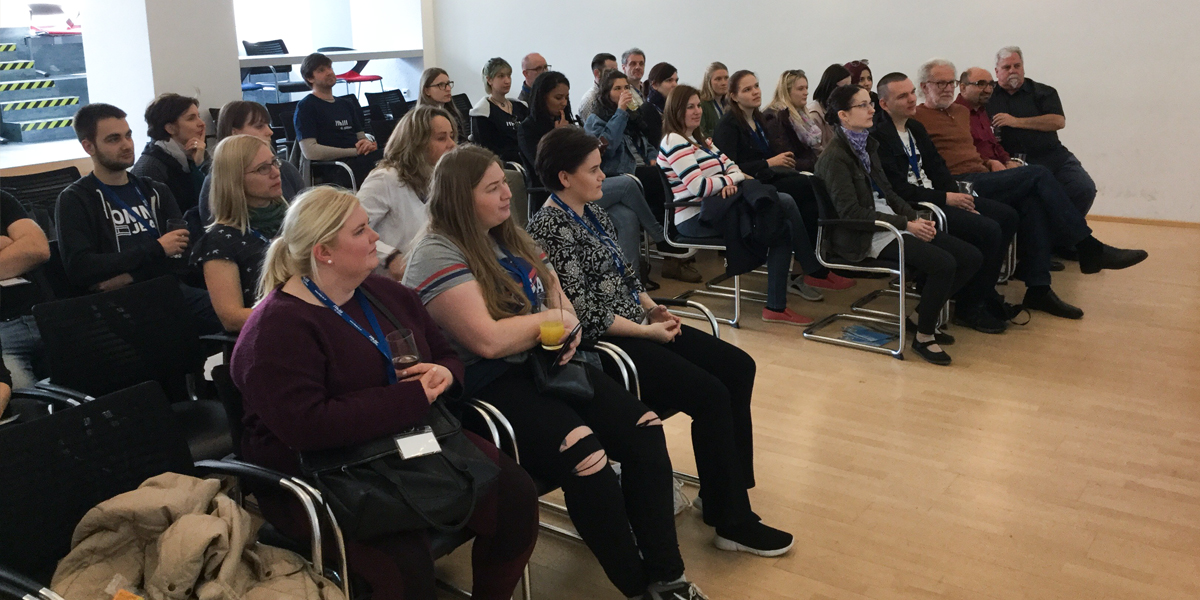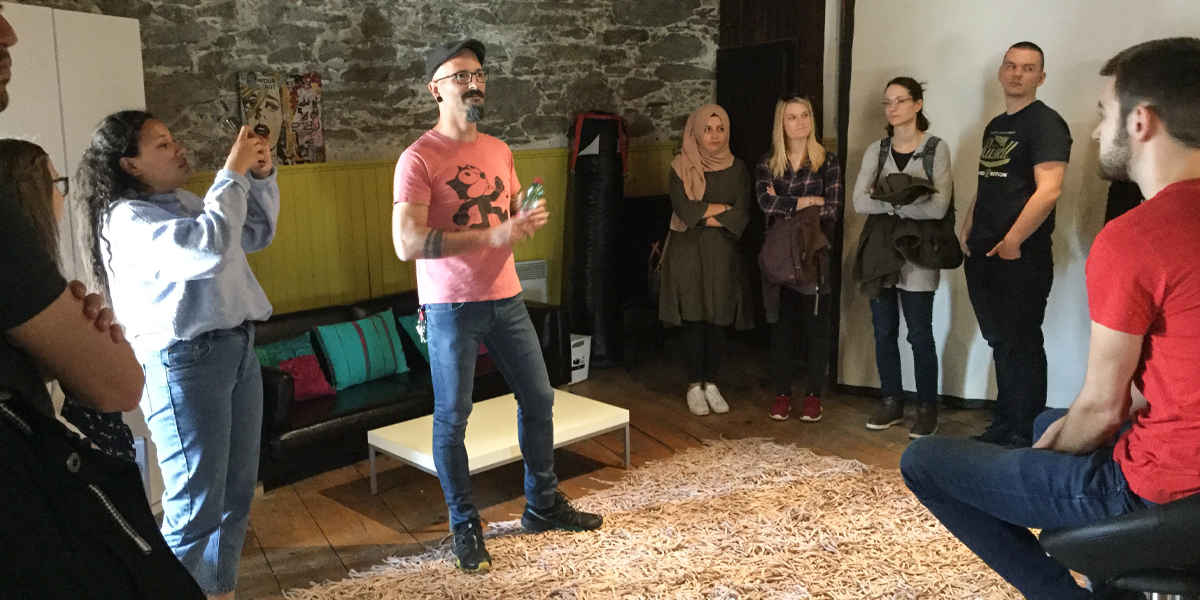Diversity matters: international perspectives on one of Humak´s strategical strengths
- Kirjoittaja: Satu Riikonen, Senior Lecturer, Humak University of Applied Sciences, 03.6.2019
- Kirjoittaja: Janina Sjöstrand, Senior Lecturer, Humak University of Applied Sciences, 03.6.2019
The theme of this year´s International Week in St. Poelten was Diversity Matters; Meeting the challenges plurality and differences in/for social works. The topic addresses some of Humak´s strategical strengths, Organization work, Work communities and Integration. Within these strengths, we focus on developing activities that facilitate civic activity, communality and inclusion of immigrants.
One key aspect in all of Humak’s three fields of education (1. NGO and Youth Work, 2. Cultural Management, 3. Interpreting and Linguistic Accessibility) are issues related to immigration. The degree programme in NGO and Youth Work responds to the requirements of immigrant integration, training and employment, community support and development, and individual support. Immigration also has an impact on demand for interpreters and, in particular, community interpreting services need to be developed. Multiculturalism and participatory methods in their various forms are part of the expertise of cultural managers.
By participating in the International Week, we wanted to find out what kind of theories and methods are used at the moment in the other European countries when working with immigrants and other multicultural groups. Our aim was also to contribute to the theme of the week, by sharing our own experiences and the knowledge gained through Humak´s RDI-projects. Humak manages several ongoing projects with external funding, related to diversity such. Porukalla pääosaan , BAANA, TEMPO and PELIMO, are examples of successful projects within the theme. Matters of multiculturalism, diversity and inclusion are part of Humak´s curricula, meaning that the theme of the International Week was very interesting to us from many perspectives.
During a field trip to the Office for Diversity in Poelten, the participants of the International Week were introduced to the wide range of multicultural services that they provide.
Workshops on diversity
The week was full of interesting lectures and workshops concerning diversity. Kim Norbygaard and Mette Strange Ørum (University College Lillebaelt, Odense, Denmark) gave a workshop called Intercultural competence in social work. Kim started by introducing the concept of intercultural competence by reflecting upon terms such as cultural awareness, cultural consciousness, non-discriminating practices and cultural reflexivity. The participants of the workshop reflected in small groups upon which cultural factors were related to a fictive social work case. We became aware of our own possible “cultural baggage” and reflected upon what kind of influence our own culture can have on our perception and understanding of immigrant’s situation in the professional work. Mette Strange Ørum presented a conflict theory method where conflicts are divided into different sections and levels. In small groups we tried to place the dilemma, a conflict between a social worker and her/his customer with an immigrant background, at the level we thought was the strongest underlying cause of the conflict situation.
A visit at the Youth Center Pulvertum in Krems. The aim of the Association is to support young people with a migrant background, facilitate mobile youth work, provide asulym coordination and has a unit for integration called Krems Interkulturell.
In another workshop, Trust and distrust among refugee youths, Hans A Hauge and Steinar Vikholt from Norway (Faculty of Health and Social Sciences, University of South Eastern Norway), tried to explain what may lie behind the distrust among young refugees towards authorities. Trust is a complex concept and Hans began by opening up the three intertwined dimensions of trust. Hans talked about trust in systems and in institutions, and mentioned that refugees typically come from societies where personal trust is (or has to be) high and generalized trust and trust in institutions is low. Hans continued by talking about the double liminality amongst young refugees and explained how they can be seen as “between borders”. Liminality means living in uncertainty, being in-between what could be taken for granted in the past and the indeterminate future. The refugee youths are in a liminal phase between the country of origin and the host country and also between adolescence and adulthood. In other words, this kind of liminality explains a part of the vulnerability and resourcefulness of young refugees. The workshop ended with a discussion about how to improve the impression of being trustworthy when working with young refugees, by being more competent, honest and reliable.
Different degree programmes in Europe for future professionals in the social field
Many of our partner UAS in the SocNet99-network educate social workers. Students graduating from Humak´s degree programme in NGO and Youth Work, become community educators. Many of the competences learned throughout the studies in Humak are similar to the ones in studies of social work in Europe. The NGO and Youth work degree programme’s intended outcomes are based on community, pedagogical, social and development competences. The programme also has a strong focus on international competence. Students develop an advanced understanding of social and cultural diversity. Upon successful completion of the programme, students will be able to identify the determinants of personal growth, development and well-being, and the role and applications of preventive work especially in the context of youth work. Unlike social workers, who often are employed by municipalities, students graduating from Humak mainly work in the field of NGO and the youth work. The programme prepares professionals with expertise in appreciative interaction for NGO and youth work, and for increasingly more varied professional settings across a range of sectors.
The International Week, once again, left us with new ideas and perspectives on diversity, multiculturalism and inclusion. We gained new useful tools to be used in both coaching of students in matters of diversity and in RDI-projects.
Sources:
The Strategy 2020 of Humak University of Applied Sciences (pages 27-45 in English)
https://www.humak.fi/wp-content/uploads/2014/07/Strategia-humak-2020-1.pdf
Humak´s Curriculum 2018-2024 for Community Educator, Bachelor’s degree
https://wiki.humak.fi/download/attachments/2984630/Community%20education%20CURRILUM%202018-2024.pdf?version=3&modificationDate=1520431875000&api=v2
SocNet98 and the annual International Week
Humak University of Applied Sciences (Humak) belongs to a European Network of Universities of Applied Sciences called the SocNet98-network. All the UASs involved in the network provide education in the field of Social Sciences or closely related fields on a bachelor´s level. Each year the network arranges an International Week at four different universities around Europe. During the International Week, students and lecturers from different counties gather around a current topic within the common field. The International Week offers an excellent opportunity for the network partners to share knowledge, experiences, and best practices and to find new solutions to different common challenges within the field.
This spring, lecturers Satu Riikonen and Janina Sjöstrand, joined the International Week at St. Poelten University of Applied Sciences in Austria, together with four students from Humak. The students who took part in the week were Miia Mäkilä, Anna Mäkinen and Seila Ruuhimäki from Turku campus and Vesa Pykälistö from Kuopio campus.



